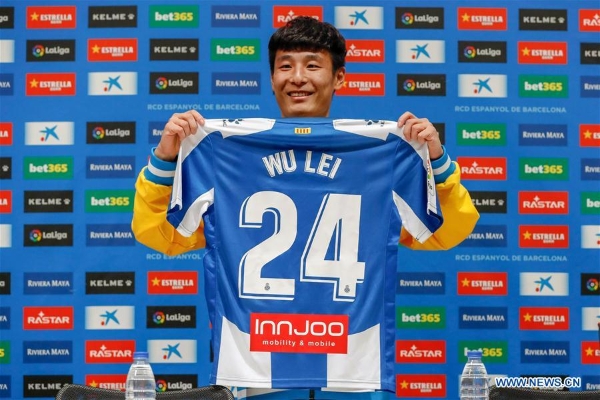Chinese firms find new ways to go global
 0 Comment(s)
0 Comment(s) Print
Print E-mail Xinhua, March 5, 2019
E-mail Xinhua, March 5, 2019

Workers are busy stitching and ironing the white and blue jerseys of the Spanish football club Espanyol in a Kelme factory in the Chinese city of Quanzhou to meet the soaring domestic demand boosted by Wu Lei, a Chinese striker who joined the club a month ago.
Wu made history by becoming the first Chinese player to score in a La Liga match last Saturday, sending his fans into a frenzy.
"Over the last month, we have sold over 10,000 Wu Lei jerseys," said Ke Yongyuan, president of Kelme (China), who owns the Yuanxiang garment company in the sportswear manufacturing hub in east China's Fujian Province.
Prior to Wu's debut in Europe, Yuanxiang acquired 80 percent of Kelme's shares and became the controlling shareholder of the renowned international brand.
Yuanxiang's expansion offers a glimpse into Chinese manufacturers' endeavor of going global.
"We manage the international brand with a Chinese 'engine,'" said Ke, adding that Wu's burgeoning takeoff in Spain is a "happy surprise" as his sparkling performance draws increasing worldwide attention.
Kelme, founded in 1963, is the official sponsor of a number of Spanish La Liga clubs such as Espanyol and Real Valladolid. In its heyday in the 1990s, Kelme was the sponsor of Real Madrid, one of the world's most successful football clubs.
Ke said his factory in Quanzhou used to make jerseys and hoodies for Kappa, UMBRO, FILA, and Kelme. However, the razor-thin profits of the OEM model pushed him to explore ways for building the company's own brand. It was searching for a "new engine" to tide over the difficulties of shrinking overseas orders and rising labor cost.
"Companies can no longer make a name for themselves by bombarding consumers with advertisements. Besides, it was way too expensive. We thought buying big international brands might be a 'shortcut', so we started as their brand franchisor in China," said Liu Zejun, chief marketing officer of Kelme (China).
In 2014, Kelme sold its franchises in China to Ke's firm.
Ke said instead of eyeing top-level clubs, his firm forayed into the niche market of campus football and low-level leagues in China, which helped bring in rapid growth. Its sales have doubled every year since 2014, reaching 800 million yuan (119.5 million U.S. dollars) in 2018.
The fast expansion of the Kelme brand in China contrasted starkly with its shrinking global market, which led to a further deal between Yuanxiang and Kelme. In 2018, the Chinese company acquired controlling shares in the Spanish sportswear company for 300 million yuan.
Several Chinese manufacturers have adopted a similar development model. Headquartered in Quanzhou and listed on Hong Kong Exchanges and Clearing, ANTA Sports, which became the world's third largest sportswear company by market value in 2018, reaped a record profit of 24.1 billion yuan in 2018, up 44.4 percent over the previous year, double-digit growth for five years in a row.
Back in 2009, ANTA acquired franchises for FILA Group's trademarks on the Chinese mainland as well as in Hong Kong and Macao.
However, buying foreign brands is only a step in Chinese companies' transition towards going global. "We don't want to be the Chinese Nike, but the world's ANTA," said Ding Shizhong, chairman and CEO of ANTA. The company considered design and scientific research as the key to improving the brand's value.
Alongside overseas acquisitions, Chinese enterprises have been seeking new "growth engines" through the robotic revolution, industrial innovation, and green development, according to Ke.






Go to Forum >>0 Comment(s)